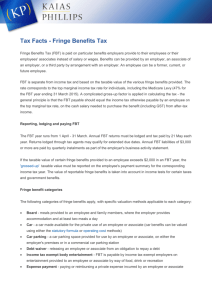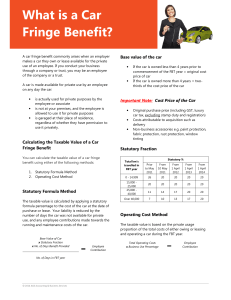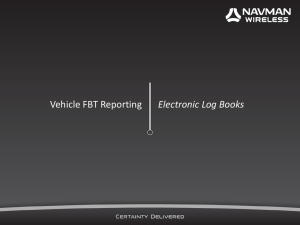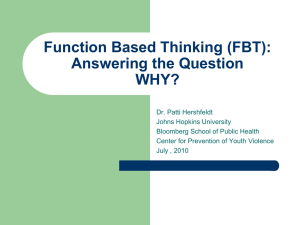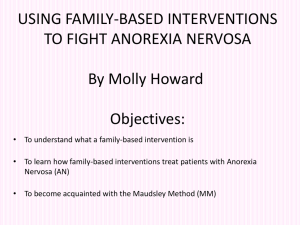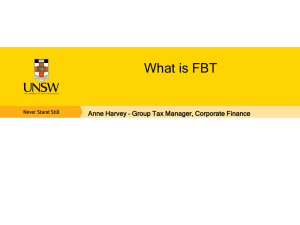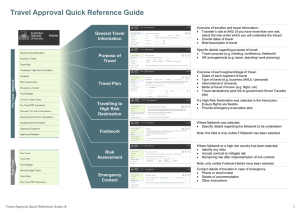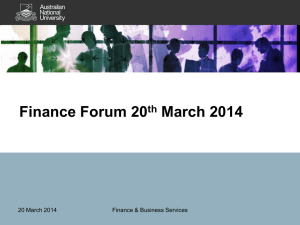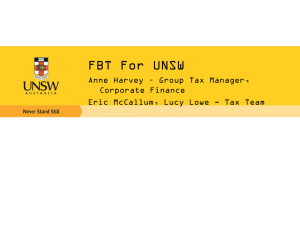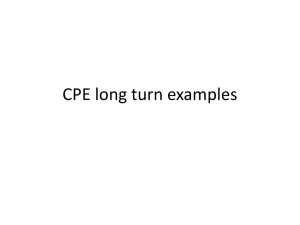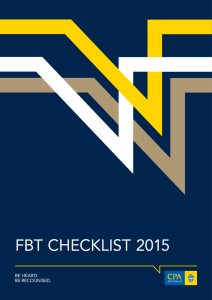File Ref: - Flinders University
advertisement
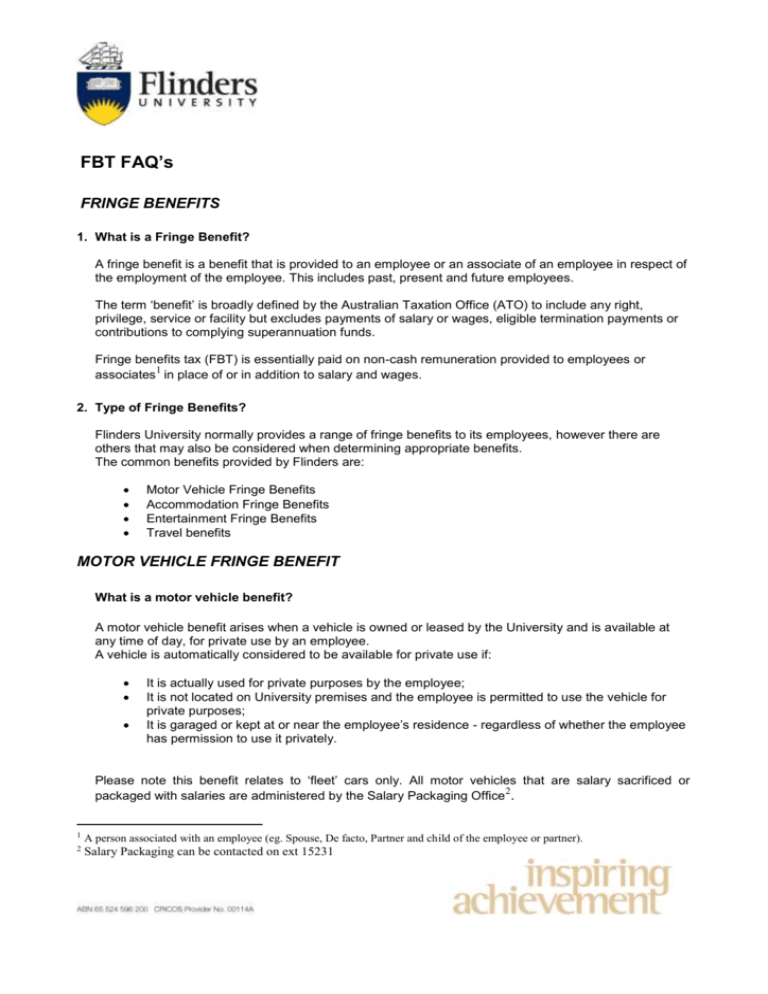
FBT FAQ’s FRINGE BENEFITS 1. What is a Fringe Benefit? A fringe benefit is a benefit that is provided to an employee or an associate of an employee in respect of the employment of the employee. This includes past, present and future employees. The term ‘benefit’ is broadly defined by the Australian Taxation Office (ATO) to include any right, privilege, service or facility but excludes payments of salary or wages, eligible termination payments or contributions to complying superannuation funds. Fringe benefits tax (FBT) is essentially paid on non-cash remuneration provided to employees or associates1 in place of or in addition to salary and wages. 2. Type of Fringe Benefits? Flinders University normally provides a range of fringe benefits to its employees, however there are others that may also be considered when determining appropriate benefits. The common benefits provided by Flinders are: Motor Vehicle Fringe Benefits Accommodation Fringe Benefits Entertainment Fringe Benefits Travel benefits MOTOR VEHICLE FRINGE BENEFIT What is a motor vehicle benefit? A motor vehicle benefit arises when a vehicle is owned or leased by the University and is available at any time of day, for private use by an employee. A vehicle is automatically considered to be available for private use if: It is actually used for private purposes by the employee; It is not located on University premises and the employee is permitted to use the vehicle for private purposes; It is garaged or kept at or near the employee’s residence - regardless of whether the employee has permission to use it privately. Please note this benefit relates to ‘fleet’ cars only. All motor vehicles that are salary sacrificed or packaged with salaries are administered by the Salary Packaging Office 2. 1 A person associated with an employee (eg. Spouse, De facto, Partner and child of the employee or partner). 2 Salary Packaging can be contacted on ext 15231 What use of University vehicles is non-taxable? The use of fleet cars during business hours is considered to be for business purposes and hence exempt from FBT. Any private use of fleet vehicles is to be separately identified to enable the FBT on this benefit to be calculated. Out of hours business travel is also exempt from FBT. Employee use of certain commercial vehicles is exempt, where the only private use is for work related travel (i.e. home to work travel or travel incidental to work duties) or for other minor, infrequent and irregular private use. This applies to utes, vans and other commercial vehicles. This does not include 4WD drives. What to do if a University vehicle is used for private use? There are 2 options. The first option is to reimburse the University using the cents per Km method. The value is worked out by determining the total private kilometre and times it by the ATO value 3. Example: J Bloggs a researcher for the School of Soccer Studies is conducting some research on rural soccer clubs using a fleet car a Berrai 2.0 lt sedan. His business travel includes visiting 3 clubs in the South East of SA, he then decides to visit friends for the day. This extra visit is not business and adds 80 extra Kms to the overall travel. J Bloggs needs to reimburse the University $59.20 (80kms X .74 cents for cars between 1.6 lt and 2.6 lt per the ATO table) for the School of Soccer to avoid any FBT. The second option is to pay FBT on the private portion of the travel. Please contact the Tax Accountant or Salary Packaging Office for further guidance. This is charged to the cost centre once a year. ACCOMMODATION FRINGE BENEFIT What is an accommodation fringe benefit? An accommodation (housing) fringe benefit arises where an employer grants an employee or associate a ‘housing right’. In terms of the ATO this is a right to occupy or use the accommodation. Accommodation includes a house, flat or home unit and accommodation in a hotel, motel, guesthouse or other living quarters. The use of accommodation as a usual place of residence is an accommodation fringe benefit. This currently only applies to Flinders Housing. What types of accommodation expenditure payments are non-taxable? There is only one applicable accommodation benefit that are non-taxable that is applicable to Flinders, this is accommodation covered by a Living Away From Home Allowance (LAFHA). For FBT purposes, LAFHA is an allowance paid by Flinders to staff to compensate for additional expenses incurred and any disadvantages suffered because the staff member is required to live away from their usual place of residence in order to perform their employment duties. The term 'additional expenses' does not include expenses the employee would be entitled to claim as an income tax deduction. Accommodation provided outside Australia Accommodation provided outside Australia as the employee’s usual place of residence is subject to fringe benefits tax. The market value of accommodation provided outside Australia must be determined each year. The taxable value is the market value reduced by any rent contributed by the employee. For further information please contact HR systems. 3 http://www.ato.gov.au/individuals/content.asp?doc=/content/33874.htm 2 ENTERTAINMENT FRINGE BENEFIT What are entertainment benefits? Entertainment in terms of the ATO means entertainment by way of food, drink or recreation, or accommodation or travel in relation to the provision of entertainment by way of food, drink or recreation. Entertainment provided by Flinders University to an employee (and/or associates of the employee) is subject to fringe benefits tax. Each transaction must be looked at individually in terms of its nature and substance. There are generally few circumstances where an entertainment benefit is not subject to FBT. A checklist can be found at http://www.flinders.edu.au/finance-files/documents/CHECKLISTmeals.doc this identifies functions most likely to be conducted by the University. What types of expenditure are ordinarily considered to be entertainment benefits? Provision of the following is subject to FBT (refer Taxation Ruling TR 97/17): Food or drink consumed on University premises by employees and/or associates at a social function; Food or drink consumed on University premises in an in-house dining facility by employees and/or associates at a social function; Food or drink consumed on University premises in an in-house dining facility by associates of employees not at a social function; Morning or afternoon tea or light lunches to employees where alcohol is provided (as it constitutes entertainment and this is non-deductible expenditure for income tax purposes – see Taxation Ruling IT 2675) Morning and afternoon teas and light lunches to associates of employees; Food or drink consumed off University premises by employees and/or associates at a social function or business lunch; One employee entertains another employee (including an employee of a company associated with Flinders) and is reimbursed by Flinders; Where employees dine together at a restaurant and the meal is paid for with a University credit card (corporate card); and Any other ‘non deductible’ meal entertainment provided to employees whether or not on university premises. What types of expenditure are NOT considered to be entertainment benefits? Provision of the following is not subject to FBT (refer Taxation Ruling TR 97/17): Food or drink consumed on University premises in an in-house dining facility by employees not at a social function; Morning and afternoon teas and light lunches to employees; Food or drink consumed on University premises by clients (either at a social function, or in an in-house dining facility), including morning and afternoon tea and light lunches; Food or drink consumed off University premises by clients at a social function or business lunch; Alcohol provided at the conclusion of a CPD Seminar with finger food; Food or drink consumed by employees while travelling, including when dining with clients and other employees; and Meals consumed by employees while attending a seminar not held on University premises, which are incidental to the seminar. How do we calculate the FBT? The FBT is automatically calculated monthly. The proportion of the entertainment provided to employees should be coded : XX-XXX-XXXXX-2050. 3 The impact of FBT on your Cost Centre from entertainment Any FBT on Meals and Entertainment (Acc 2050) will be calculated and allocated to account 3608 at the end of each month. This allows you to see the financial impact of FBT on meals and entertainment. The example below illustrates how FBT is calculated. Take the month’s balance in 2050. Multiply balance by 10% to get GST inclusive figure. The sum of the above will then be multiplied by ( Type 1 Grossed up rate x FBT rate). The result of this will be debited to your cost centre account 3608. 1 Current balance for May is $56.00 2 $56.00 x 10% = $56.00 + 5.60 = $61.60 3 $61.60 x 2.0802 x 47% = $60.23 - This is the FBT that will be charged to your Cost Centre account 3608 N.B. 2.0802 x 47% = 98% TRAVEL FRINGE BENEFIT The University is liable to pay FBT on all travel costs for employees or associates that are of a private nature and are paid by the university. Flinders pays FBT on airline costs using a time basis test providing the dominant purpose of travel is business i.e. Travel must be for University business. The time basis test means if the private component is equal to or greater than your business component then FBT is payable on a portion of the flight cost (assuming Flinders has paid for the staff member). When to use a travel diary? A travel diary must be kept in respect of fringe benefits relating to: travel outside Australia that involves the employee being away from their usual place of residence irrespective of the duration; or travel within Australia that involves the employee being away from their usual place of residence for a continuous period including more than 5 nights, where the travel was not undertaken exclusively in the course of employment. The fact that the business travel is such that the employee is required to stay away over a weekend will not, in itself, mean that the trip is not undertaken exclusively in the course of his or her employment. Examples to determine if a travel diary is required: Any travel inside Australia solely for business purposes (no private component) – Travel diary not required Travel includes 5 or less consecutive nights inside Australia with a private component – Travel diary not required Travel includes 6 or more consecutive nights inside Australia with a private component – Travel diary required All travel outside Australia for full or part University business – Travel diary required How to calculate FBT on the flight cost? Example Travel Ticket cost $550 GST Inclusive. Total days travelling 10 with 5 days being private Cost of Ticket Total No of days $550.00 10 4 Number of Private days 5 Daily Rate $55.00 Total Private Component - Individual may elect to pay this amount $275.00 Grossed up Rate for Travel within Australia $567.79 ($275*2.0802) FBT due (if FU paid for the flight) @ 47% $268.87 If the private component is less than 5 days in the above example. No FBT is payable on the flight costs only. Please note if an employee during business travel incurs expenses (paid by the University) of a private nature such as sightseeing this will incur FBT, these expenses must be coded to account 2050. Furthermore, any costs (paid by the University) incurred during the private component such as accommodation and meals would also incur FBT. How is FBT calculated? The FBT rate is 47% from 1 April 2014, this was previously 46.5%. An important point to note in regard to the calculation of fringe benefits tax is that where an employee makes a payment to the University (as a contribution towards the cost of providing the fringe benefit), the taxable value is reduced by that particular payment. The University is required to classify fringe benefits into two types: Type 1 – GST creditable; and Type 2 – non GST creditable. As the University is liable to GST on almost all benefits provided to employees gross up rate type 1 must be applied in calculating the taxable value of fringe benefits. Example: If the University provided a fringe benefit of $110 (GST inclusive amount) to an employee in the 20014/15 tax year, the cost to the University would be as follows: Taxable value $110 x (0.47 + 0.10) (1-0.47) x (1 + 0.10) x 0.47 = $110 x 2.0802 (Grossed-up taxable value) $228.83 The formula used to calculate tax payable is: FBT payable = Taxable value x FBT rate = $228.83 x 0.47 Continuing the example above: FBT payable = $107.55 Thus on the provision of a fringe benefit of $110 (GST Inclusive) the University pays FBT of $107.55 or effectively 98% tax. 5
